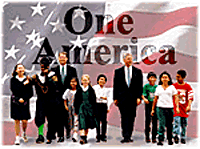 |
 |
According to the University of Pennsylvania's Center for Greater Philadelphia, in 2020, 45% of the nation's youth under 18 years of age will be non-white; and in 2050, a significant percent of the nation's population will be non-white. The center addresses these changing racial demographics through the Greater Philadelphia High School Partnership: Students United in Service. The partnership has two distinct efforts in which schools can participate: A project-based service-learning track that has existed since the center initiated the partnership in fall 1995, and a curriculum-based service-learning track that the center initiated for the first time in fall 1997.
In conjunction with area educators, administrators and students, the partnership's efforts bring together teams consisting of students from high schools in the city and the suburbs to work on service-learning projects that benefit the region. The first phase of the program occurs in the fall and is devoted to recruitment, advisor and student training, and networking. In the second phase, which occurs from fall to spring, teams select, design and carry out their community-service projects. After getting acquainted, each team discusses issues facing the region, explores service projects they could carry out together and decides on a project to pursue. Some teams invent their own projects from scratch, while others contribute their volunteer efforts to existing, adult-led community-service programs. The center assists students in developing their projects, identifying volunteer opportunities at organizations and helping teams link up with these organizations. In the third phase, which runs through April and May, teams showcase the results of their service projects and celebrate their efforts at the annual Greater Philadelphia High School Convocation. The curriculum-based service-learning efforts provide an academic context in which students learn how to overcome stereotypes and develop positive relationships. Students emerge from their projects with knowledge about the sources of the problems that their projects address, and they also gain an introduction to the complexities associated with solutions.
Outcomes and Significant Accomplishments In the 1997-1998 pilot year, three city and three suburban schools were paired to participate in the curriculum-based effort. In the 1998-1999 school year, the project expects to expand to eighteen schools. During the 1997-1998 school year, over 750 students and 123 faculty advisors participated in the service-learning effort. They came from 78 high schools--evenly divided between city and suburban schools, with a mix of public, private and parochial institutions. Students developed, planned and completed 20 year-long innovative service projects that addressed homelessness, hunger, alcohol and drug use, teen pregnancy and environmental pollution.
|
![]()
To comment on this service,
send feedback to the Web Development Team.
![[White House icon]](/New/images/home_pin.gif)
![[Help Desk icon]](/New/images/help_pin.gif)